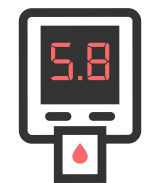Medication Errors: Understanding the Causes and Designing Effective Risk Management Strategies

Overview: The purpose of this module is to engage health care providers (prescribers), pharmacists, and other health care professionals in evidence based practices to avoid medication errors and enhance patient safety. Successful attainment of knowledge by the learner will enable improved awareness and lead to changes in clinical practice measures to overcome common causes of medication errors.
Category
Format
- Enduring Material
Credits
- 2.00 ACPE Pharmacist
- 2.00 ACPE Pharmacy technician
- 2.00 AMA PRA Category 1 Credit™
- 2.00 Completion
Cost $0.00
Tobacco Cessation

Overview: This module provides an overview of tobacco cessation approaches, and how scientific evidence is applied to support everyday clinical decision-making. Users of this module will learn about the epidemiology of tobacco and nicotine-based products, the underlying neuroscience of nicotine addiction, and assess pharmacologic and behavioral approaches to enable patients to quit their use of them. The course describes clinical strategies, best practices, and community resources that health care practitioners can use to ensure the best results of cessation therapy for their patients.
Category
Format
- Enduring Material
Credits
- 2.00 ACPE Pharmacist
- 2.00 ACPE Pharmacy technician
- 2.00 AMA PRA Category 1 Credit™
- 2.00 Completion
Cost $0.00
Implicit Bias

Overview: This module provides an overview of implicit bias, and how it is manifested in everyday clinical decision-making. Viewers will learn about the underlying psychology and neuroscience of implicit associations, and assess their own biases to increase self-awareness. This course also describes debiasing strategies and best practices to mitigate risks of the impact of bias on treatment and care.
Category
Format
- Enduring Material
Credits
- 1.50 ACPE Pharmacist
- 1.50 ACPE Pharmacy technician
- 1.50 AMA PRA Category 1 Credit™
- 1.50 Completion
Cost $0.00
Diabetes Medications and Treatments: Clinical Updates

OVERVIEW: Dr. Isaacs, a Clinical Pharmacist and Certified Diabetes Care and Education Specialist, discusses the pharmacologic mechanisms of diabetes medications, explores the latest evidence on how they affect heart, kidneys, and weight management, and identifies potential side effects and clinical pearls. Additionally, you will learn how to design a therapeutic regimen and monitoring plan for patients based on the updated diabetes treatment algorithm and how to add non-insulin agents to insulin therapy. By focusing on evidence-based learning and practical application, this course equips healthcare professionals with the knowledge and skills required for effective diabetes care management. This asynchronous enduring course requires a passing score on the knowledge checks, as well as a completed course evaluation to claim credit.
Category
Format
- Enduring Material
Credits
- 1.50 ACPE Pharmacist
- 1.50 ACPE Pharmacy technician
- 1.50 AMA PRA Category 1 Credit™
- 1.50 Completion
Cost $0.00
[On-Demand] Long COVID: Exploring Advancements & Management

Overview: This adapted one-hour virtual webinar on Long COVID, is designed to give healthcare professionals a comprehensive understanding of the latest case definitions, pathophysiology, and clinical manifestations of this condition. This session covers diagnostic evaluations and presents the newest evidence-based treatment options for symptoms such as fatigue, neurocognitive dysfunction, pain, and sleep disturbances. Led by esteemed experts, this webinar aligns with public health priorities and provides valuable insights for improving Long COVID care and management.
Category
Format
- Enduring Material
Credits
- 1.00 ACPE Pharmacist
- 1.00 ACPE Pharmacy technician
- 1.00 AMA PRA Category 1 Credit™
- 1.00 Completion
Cost $0.00
Pharmacy: Pioneering Innovations & Patient-Centric Services

Overview: This course explores the evolving landscape of the pharmacy profession and its impact on care delivery. Participants will delve into various aspects of the future of pharmacy, including emerging trends and pharmacy access, as well as how to partner with pharmacists and leverage pharmacies for improved patient outcomes.
Category
Format
- Enduring Material
Credits
- 1.00 ACPE Pharmacist
- 1.00 ACPE Pharmacy technician
- 1.00 AMA PRA Category 1 Credit™
- 1.00 Completion
Cost $0.00
Allergies & Anaphylaxis: An Overview of Recent Developments
Overview: This comprehensive course is designed to equip healthcare professionals with essential knowledge and skills in addressing allergic reactions and anaphylaxis. Covering topics such as definition, diagnostic criteria, and clinical manifestations, the course provides insights into intervention strategies and treatment protocols for both home and acute care settings. Participants will also explore recent advancements in allergy prevention and therapeutic approaches. Through interactive discussions and practical scenarios, learners will gain a deeper understanding of emergency management and recognition, ensuring prompt action for improved patient outcomes. This course empowers healthcare professionals to effectively identify, manage, and prevent allergic emergencies in diverse healthcare settings.
Category
Format
- Enduring Material
Credits
- 1.50 ACPE Pharmacist
- 1.50 ACPE Pharmacy technician
- 1.50 AMA PRA Category 1 Credit™
- 1.50 Completion
Cost $0.00
Obesity Management
Overview: Designed for healthcare professionals, this interactive virtual course equips participants with comprehensive strategies for the medical treatment of obesity. The curriculum is tailored to those committed to mitigating the health impacts of obesity, such as prescribers, pharmacists, and allied health workers.
Category
Format
- Enduring Material
Credits
- 1.50 ACPE Pharmacist
- 1.50 ACPE Pharmacy technician
- 1.50 AMA PRA Category 1 Credit™
- 1.50 Completion
Cost $0.00
Antimicrobial Stewardship: Syndromic and System-Level Interventions

Overview: This course overviews the history of antibiotics and how antimicrobial overuse has led to a public health emergency in our communities. Presenters overview the concept of antimicrobial stewardship and its core elements. Learners will obtain knowledge of syndromic stewardship and how to customize interventions based on community needs. Additionally, learners will hear about system-level interventions using examples of systems in the DC area. For both syndromic and system-level stewardship, proper implementation practices will be reviewed. This module provides 1.5 hours of CME.
Category
Format
- Enduring Material
Credits
- 1.50 ACPE Pharmacist
- 1.50 ACPE Pharmacy technician
- 1.50 AMA PRA Category 1 Credit™
- 1.50 Completion
Cost $0.00

 Facebook
Facebook Twitter
Twitter LinkedIn
LinkedIn Forward
Forward